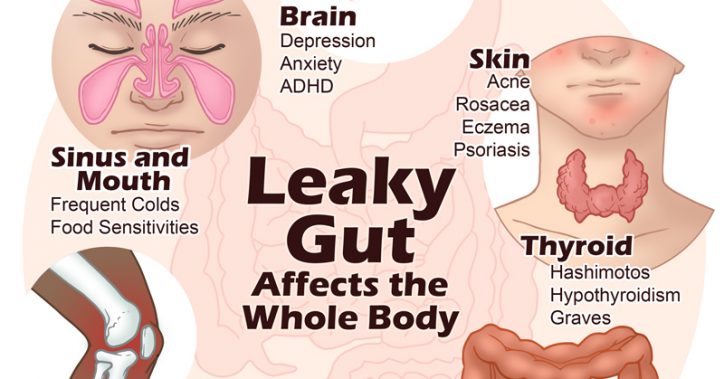What Does a Leaky Gut Look Like?

What Does Leaky Gut Look Like?
“Leaky gut syndrome is said to have symptoms including bloating, gas, cramps, food sensitivities, and aches and pains. But it’s something of a medical mystery,” says gastroenterologist Donald Kirby, MD.
And really, you can’t blame the doctors for being confused. Leaky gut can look like so many illnesses. Most of them, you wouldn’t even normally associate with digestion. Such symptoms as chronic itchiness, rashes, problems with metabolism, mood issues, chronic stuffy head, belly bloat, and allergies of all sorts can be caused by a leaky gut! And that’s just the tip of the iceberg.
A Clinical Condition with Many Symptoms
It’s not hard to imagine that these digestive disorders might be caused by a leaky gut – diarrhea, constipation, GERD, gas and bloating, food sensitivities, gastritis, colitis, Crohn’s disease, celiac, IBS, gluten intolerance, pancreatitis, hepatitis… These are all associated with the digestive tract. So it’s not a big mental leap to make the connection. But as hard as it may be to believe, leaky gut can also show up in a lot of other ways such as the ones below:
- Skin problems such as eczema, psoriasis, rosacea, hives, teenage acne and cystic acne.
- Musculo-skeletal disorders including joint pain, muscle pain and weakness, fibromyalgia, chronic fatigue syndrome, and osteoarthritis.
- Auto-immune disorders such as allergies, arthritis and rheumatoid arthritis, Type 1 diabetes, hyper-sensitivities, Lupus, frequent infections or low grade fevers.
- Cardiovascular disease including atherosclerosis, arteriosclerosis, high blood pressure, and elevated cholesterol levels.
- Neurological disorders like headache, migraine, poor cognition, “brain fog,” autism, depression, anxiety, ADD, OCD, MS, Alzheimer’s, Parkinson’s, and RSD/CRPS.
- Hormonal imbalances including PMS, ovarian cysts, events leading to hysterectomy, thyroid disorders, excessive facial hair in women and adrenal fatigue.
- Respiratory ailments like asthma, hay fever, sinus problems, chronic nasal congestion or runny nose.
- And possibly the most widespread leaky gut issue? Obesity. It’s rampant in our society. And ironically, chronic underweight is linked to gut problems as well.
What causes this damage?
How do you get a leaky gut in the first place?
The medical community agrees that leaky gut appears to be associated with your diet! And as corporations get better at making foods more convenient, nutrition seems to go by the wayside in order to make more room for profits. I mean, just look at the acronym: Standard American Diet. SAD. If your diet is filled with processed foods, sugar, chemicals, and trans fats, and is low in fiber and actual nutrients, then yes. Less-than-ideal nutrition is likely to be a culprit.

Chronic stress has also been implicated as a possible cause of gut dysfunction. This seems like a biggie to me, because I have lots of stresses in my life and also suffer from many of the symptoms that people with Leaky Gut present with.
There can also be a problem with medical intervention that was meant to fix another health issue:
- Acid reflux medicines (PPIs) and antacids reduce the amount of acid in your stomach. But you need acid to digest protein. Ironically, much of the time in cases of heartburn, stomach acid levels are actually too low, and not too high, as you would naturally think. The proper amount of hydrochloric acid needs to be present so that the rest of your digestion can work the way it’s supposed to. Plus, that protein needs to get broken down so your body can utilize it. And oddly, stomach acid is your body’s first line of defense against viruses, harmful bacteria, and parasites.
- The overuse of antibiotics are another cause of gut problems. They are sometimes necessary, but they end up killing off beneficial bacteria along with the harmful ones. Which can cause your microbial balance to get way out of whack.
- Radiation, chemotherapy, and other drugs can cause hyper-permeability of the small intestine, letting bad stuff out into our bloodstream.
- Over-the-counter meds such as aspirin and other NSAIDs (non-steroidal anti inflammatories) damage the gut lining. Remember that these drugs have long been associated with ulcerations in the digestive tract.
Stay tuned next week for How to fix a Leaky Gut.





